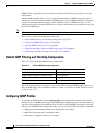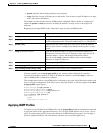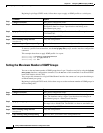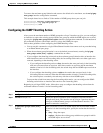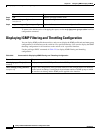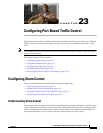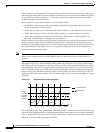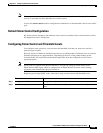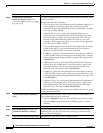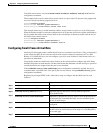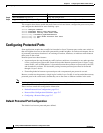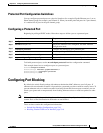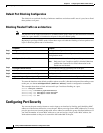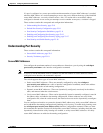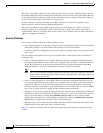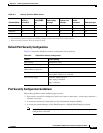
23-4
Catalyst 2960 and 2960-S Switch Software Configuration Guide
OL-8603-09
Chapter 23 Configuring Port-Based Traffic Control
Configuring Storm Control
Step 3
storm-control {broadcast |
multicast | unicast} level {level
[level-low] | bps bps [bps-low] | pps
pps [pps-low]}
Configure broadcast, multicast, or unicast storm control. By default, storm
control is disabled.
The keywords have these meanings:
• For level, specify the rising threshold level for broadcast, multicast, or
unicast traffic as a percentage (up to two decimal places) of the
bandwidth. The port blocks traffic when the rising threshold is reached.
The range is 0.00 to 100.00.
• (Optional) For level-low, specify the falling threshold level as a
percentage (up to two decimal places) of the bandwidth. This value
must be less than or equal to the rising suppression value. The port
forwards traffic when traffic drops below this level. If you do not
configure a falling suppression level, it is set to the rising suppression
level. The range is 0.00 to 100.00.
If you set the threshold to the maximum value (100 percent), no limit is
placed on the traffic. If you set the threshold to 0.0, all broadcast,
multicast, and unicast traffic on that port is blocked.
• For bps bps, specify the rising threshold level for broadcast, multicast,
or unicast traffic in bits per second (up to one decimal place). The port
blocks traffic when the rising threshold is reached. The range is 0.0 to
10000000000.0.
• (Optional) For bps-low, specify the falling threshold level in bits per
second (up to one decimal place). It can be less than or equal to the
rising threshold level. The port forwards traffic when traffic drops
below this level. The range is 0.0 to 10000000000.0.
• For pps pps, specify the rising threshold level for broadcast, multicast,
or unicast traffic in packets per second (up to one decimal place). The
port blocks traffic when the rising threshold is reached. The range is 0.0
to 10000000000.0.
• (Optional) For pps-low, specify the falling threshold level in packets per
second (up to one decimal place). It can be less than or equal to the
rising threshold level. The port forwards traffic when traffic drops
below this level. The range is 0.0 to 10000000000.0.
For BPS and PPS settings, you can use metric suffixes such as k, m, and g
for large number thresholds.
Step 4
storm-control action {shutdown |
trap}
Specify the action to be taken when a storm is detected. The default is to
filter out the traffic and not to send traps.
• Select the shutdown keyword to error-disable the port during a storm.
• Select the trap keyword to generate an SNMP trap when a storm is
detected.
Step 5
end Return to privileged EXEC mode.
Step 6
show storm-control [interface-id]
[broadcast | multicast | unicast]
Verify the storm control suppression levels set on the interface for the
specified traffic type. If you do not enter a traffic type, broadcast storm
control settings are displayed.
Step 7
copy running-config startup-config (Optional) Save your entries in the configuration file.
Command Purpose



